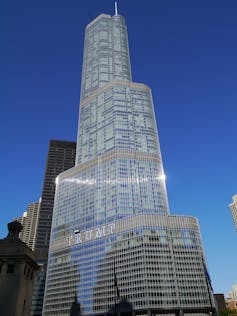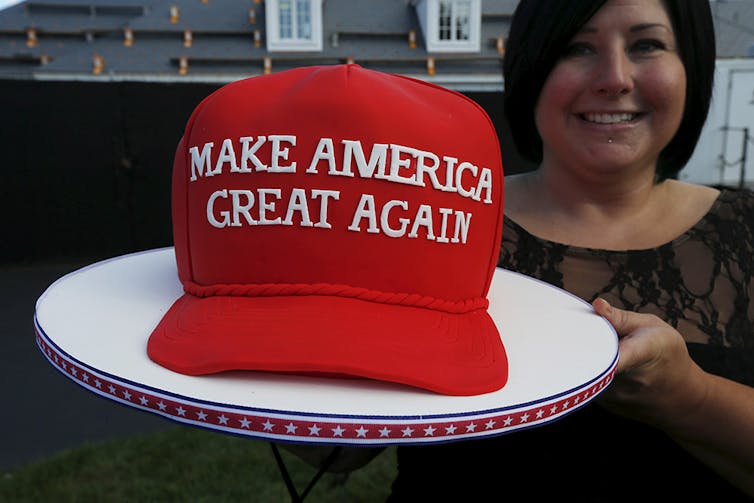Where Did Make America Great Again Come From?
Even as Donald Trump stumps for votes and kisses babies on the trail of the Usa presidential campaign, he's conspicuously still a man of affairs at heart. And that ways leaving no bang-up (and potentially valuable) slogan united nations-trademarked.
In July, just a few weeks after he announced he was seeking the Republican nomination, he obtained a trademark for the campaign slogan "Make America Great Over again". Trump had applied for the mark all the way dorsum in Nov 2012, immediately after Mitt Romney lost the ballot to Barack Obama.
The registration covers election-related services such equally "promoting public sensation of political issues". Yet, terminal August Trump filed some other trademark application for the same slogan in connexion with the right to put it on all way of clothing from T-shirts to tank tops and hats.
Since the presidential candidate started wearing his red hat bearing the slogan, the product has get a must-have amongst his supporters. Information technology can be bought in different colours for US$25 on official Trump-related websites.
Trump's fans have, all the same, recently been offered alternative – and unauthorised – products. Replica versions of the hats bearing Trump'southward slogan are sold by many for as little as US$4.99. And the tycoon-turned-pol has non waited long to protect his trademark and is currently going afterwards the people backside these knock-offs.
I such seller is CafePress, a well-known popular website that allows its customers to print their own designs on T-shirts, java mugs and other products. Trump's lawyer sent the company a warning alphabetic character only a few days ago, request it to terminate infringing the registered trademark.
Merely can you lot really trademark a slogan? And is information technology wise for a candidate asking for votes to also demand they pay upwards to don hats and shirts that bear information technology?
Distinctive not descriptive

Slogans are important elements in advertizement campaigns as brand owners promise that consumers will link them with their products and services, as well as their main brand.
A number of attempts have been made in the by to register slogans equally trademarks. Just these attempts accept often been unsuccessful and registrations accept been refused because the slogans in question were devoid of distinctive character (distinctiveness is the main requirement to annals all categories of signs).
Indeed, average consumers are often not in the habit of making assumptions virtually the origin of products on the ground of slogans, every bit they consider them every bit just advertizement messages and therefore merely informational, generic or laudatory.
For example, slogans such as "Proudly Made in the USA" (in connexion with electric shavers) and "America's Freshest Ice Cream" (in relation to ice creams) were held unregistrable in the United states for existence merely descriptive and and then indistinguishable from other similar products.
When United states multinational All-time Buy tried to annals the phrase "best purchase" when written on price tags, an EU Court deemed it devoid of any distinctive character and refused the registration. Similarly, when Citigroup tried to trademark the slogan "Live richly" the courtroom rejected it, as it was deemed that European consumers were perceive the phrase merely every bit promotional formula.
In social club to overcome such objections, make owners take to prove that the slogan they want to protect has acquired a "secondary meaning" on its ain. A slogan is idea to have acquired such meaning if the brand owner tin demonstrate that its use by another party would cause confusion amongst consumers as to the producer or provider of the appurtenances or services. Famous examples of this category of slogans are KFC's "Finger Lickin' Adept" and Nike'due south "Just Do It".

Does 'Make America Great Over again' fit the nib?
Despite successfully registering "Make American Great Again", Donald Trump may need to take on objections that his slogan is just descriptive and laudatory. Trademarks may be revoked even after registration, if judges or trademark offices later on concur they do not encounter requirements for protection and should have never been registered.
He might also be unable to bear witness that "Make America Dandy Again" has acquired a secondary meaning to move information technology beyond "descriptive" status. The slogan has been a common campaign catchphrase used in the past by several US politicians. Ronald Reagan first used it in his 1980 presidential campaign, and many people in the Us still link it to his political era. Ted Cruz and Scott Walker, other candidates for the upcoming election in 2016, have also used it.
Whether or non Trump'due south legal move is compliant with trademark police and despite his making certain he doesn't need further money to finance his cocky-funded campaign, information technology nevertheless seems an opportunistic fashion to go profits past using politics and to take economic advantages from his own supporters.
This does not come every bit a big surprise. Donald Trump knows how to create and strengthen a brand, as he has done (and is still doing), spending lots of coin licensing out his name on products and services that include ties, perfumes, water and of course hotels.
Simply when it comes to politics, which entails asking people to vote for you and then adopting policies in the pursuit of the public involvement, it sounds odd and ethically dubious to mix the latter with profit-seeking.
Source: https://theconversation.com/how-donald-trump-trademarked-the-slogan-make-america-great-again-49070
Enviar um comentário for "Where Did Make America Great Again Come From?"